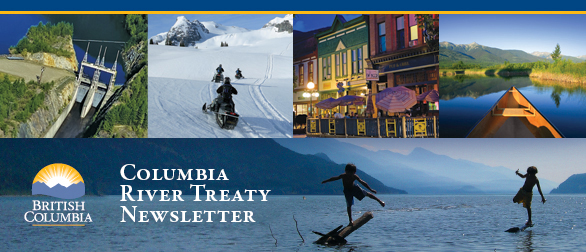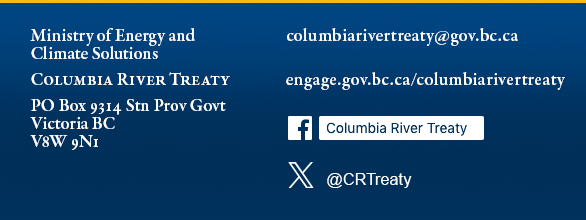Columbia River Treaty
Edition: December 2020

Treaty fact: Who is part of the Canadian Columbia River Treaty Negotiation Delegation?
Dec 23, 2020
Negotiations between Canada and the United States on modernizing the Columbia River Treaty began in May 2018. The Canadian Columbia River Treaty Negotiation Delegation consists of the following agencies:
Global Affairs Canada: is responsible for transboundary treaties and leads the Columbia River Treaty negotiations. The federal government supported British Columbia’s lead procedural role in the 2012-2014 Treaty Review; however, each government will have its own decision-making process prior to an agreement being reached with the U.S.
The Province of B.C.: represents the interests of British Columbians. The Canadian-British Columbia Agreement (1963) transferred most Treaty benefits and obligations to the Province. Although this agreement retains Canada’s constitutional jurisdiction for international treaties, it requires Canada to obtain agreement of the Province before terminating or amending the Treaty.
Columbia Basin Indigenous Nations: On April 24, 2019, the Honourable Chrystia Freeland, then Minister of Foreign Affairs of Canada, announced that representatives of the Ktunaxa, Secwepemc, and Syilx/Okanagan Nations would participate as observers at the Canada-U.S. Columbia River Treaty negotiations. Since then, representatives of the Ktunaxa, Secwepemc, and Syilx/Okanagan Nations have been present in the negotiating room and full participants in caucus meetings with Canada and B.C. during negotiating sessions. The Indigenous Nations are also partners with Canada and B.C. in developing negotiations positions and proposals, in preparatory meetings before each round of negotiations, and in debrief meetings after each round.
BC Hydro: is the Canadian Entity responsible for the implementation of the Columbia River Treaty and the operator of the Treaty dams in Canada. BC Hydro works closely with the Ministry of Energy, Mines and Low Carbon Innovation’s Columbia River Treaty Team and provides technical support to the Canadian negotiation delegation.
Environment and Climate Change Canada (ECCC): supports and advises Global Affairs Canada and the negotiation team on Canadian ecosystem and climate change issues. ECCC engineers and scientists provide technical expertise in support of the negotiations and other Treaty work in the Columbia Basin.
Natural Resources Canada (NRCan): participates on the Columbia River Treaty Permanent Engineering Board to help oversee delivery of Treaty commitments.
To learn more about lead negotiators representing Federal and Provincial Governments, read their biographies on the Province’s Treaty website.


